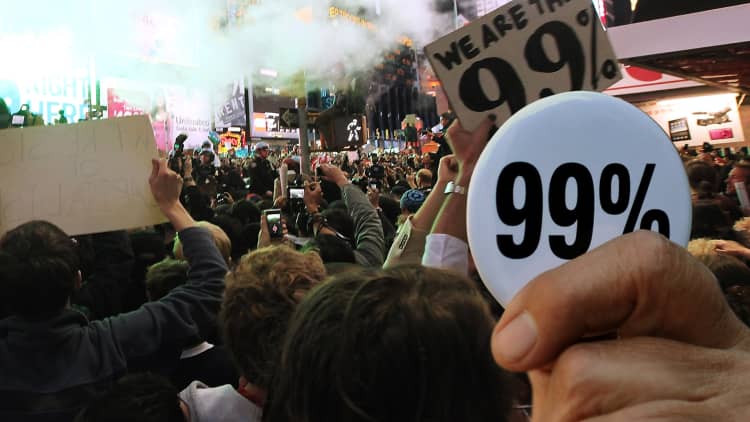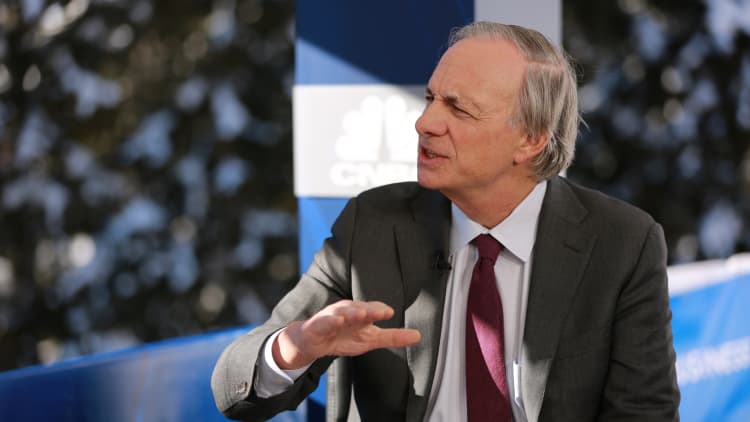Virgin Group founder Richard Branson is part of the growing circle of elite business players questioning wealth disparity in the world today.
Amid heated debate about whether the rich should be more highly taxed, the billionaire philanthropist weighed in with his own view during the Milken Institute Summit in Abu Dhabi this week.
"We have to try and do everything we can to lift the vast majority of people up, when for the last few years the vast majority have not seen their living standards improve," Branson told an audience on Tuesday evening.
"I don't think we should throw out capitalism. But for those of us who are fortunate to have made wealth, we have a responsibility to throw that out there and tackle some of the great problems. If we don't do that, then we deserve to have very heavy taxes leveled on us."

The comments come as public discontent over wealth inequality is hitting a fever pitch. Calls for higher taxes for the rich are gaining traction. The rising prevalence of populist rhetoric and growing popularity of anti-establishment politicians, economists say, is in large part a result of the sense for millions across the developed world that they've been left out of the recent decades' economic growth.
But billionaires at elite investor and "thought-leader" summits like Milken and Switzerland's Davos — while seemingly gripped by this phenomenon and how it will affect their business models — are divided on how to respond to it.
Capitalism 'not working for the majority of people'
"Capitalism basically is not working for the majority of people. That's just the reality," hedge fund mogul Ray Dalio, with a net worth of $18 billion, told a panel at Davos in January.
Today, he pointed out, "the top one-tenth of 1 percent of the population's net worth is equal to the bottom 90 percent combined. In other words, a big giant wealth gap." If he were president, he said, "I think that you have to call that a national emergency."

A recent Federal Reserve survey found that 40 percent of Americans couldn't come up with $400 in case of an emergency. And a 2019 report by Oxfam revealed that 26 people now own the same wealth as the poorest half of the world.
Higher taxes for the rich?
Most high-net worth business leaders insist that the private sector is far better equipped to fix today's major problems than inefficient or overburdened government bureaucracies. Entrepreneur Arianna Huffington, speaking to CNBC at this week's World Government Summit in Dubai, pointed to the urgent need for better health care access and said that "corporations can provide the solution."
Some, however, like investing guru Warren Buffett, have long called for higher taxes for the wealthy, writing that it's time to "stop coddling the rich" and distribute wealth more equally.
In a now-infamous New York Times op-ed from 2011, Buffett wrote, "My friends and I have been coddled long enough by a billionaire-friendly Congress. It's time for our government to get serious about shared sacrifice."
Buffett has also said he doesn't see higher tax rates discouraging investment. "People invest to make money, and potential taxes have never scared them off," he said.
The sweeping call for greater wealth parity has brought in economic populists on both the left and right. While some attribute President Donald Trump's election to widespread economic discontent, it's also heralded the rise of lawmakers like Alexandria Ocasio-Cortez, the 29-year-old congresswoman who's now calling for a 70 percent tax on the rich.
Apart from Buffett, most household-name billionaires are not huge fans of the idea, with many labeling it "outrageous" and warning of capital flight as a consequence.
Progressive — or extreme?
Microsoft founder Bill Gates has long espoused more "progressive taxes" on wealth, but rejects Ocasio-Cortez's aim to target high incomes.
"Now, you finally have some politicians who are so extreme that I'd say, 'No, that's even beyond,'" Gates told The Verge in an interview this week, in apparent reference to Ocasio-Cortez. "You do start to create tax dodging and disincentives, and an incentive to have the income show up in other countries and things."
Instead, the world's second-richest man thinks policymakers should focus on taxes on capital and the estate tax. "We can be more progressive without really threatening income generation — what you have left to decide how to spread around."


